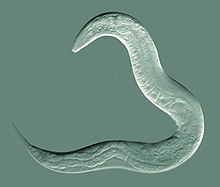 There has been much discussion recently over why the incidence of allergies and chronic diseases is rising in Western industrialized countries. Some theories have been proposed, such as the hygiene hypothesis (that early childhood environments are too sterile and so that the developing immune system isn't properly "trained"), or that medicines such as antibiotics kill off beneficial bacteria, whille others say it is due to our Western diet and lifestyle. However, recently some researchers have proposed that the absence of intestinal worms, called helminths, in our bodies is actually negative for our health and could be a reason for the rising incidence of allergies and these diseases.
There has been much discussion recently over why the incidence of allergies and chronic diseases is rising in Western industrialized countries. Some theories have been proposed, such as the hygiene hypothesis (that early childhood environments are too sterile and so that the developing immune system isn't properly "trained"), or that medicines such as antibiotics kill off beneficial bacteria, whille others say it is due to our Western diet and lifestyle. However, recently some researchers have proposed that the absence of intestinal worms, called helminths, in our bodies is actually negative for our health and could be a reason for the rising incidence of allergies and these diseases.
Over the centuries intestinal worms (such as hookworms) have caused a lot of human suffering, and therefore have been viewed as disease causing parasites. Western industrialized countries made major efforts (such as improved sanitation) to get rid of all intestinal worms in humans, and were generally successful. It is now rare to hear of someone in these countries having intestinal worms.
Dr. William Parker, an associate professor of surgery at Duke University in North Carolina, has written an interesting and thought-provoking article about the role of helminths in human health. He states: "A barrage of scientific evidence points toward helminths as being important regulators of immune function." In other words, we need them in order for our immune system to function properly.
Research actually shows that introducing certain species of intestinal worms, such as roundworms or flatworms, into the human gut successfully treats certain diseases in humans. But medicine has been slow to adopt such a view. Dr. Parker writes that viewing certain helminths as beneficial for proper immune functioning would be a "paradigm shift" in medicine.
By the way, the research looking at intestinal worms found benefits from low levels of helminths, not huge amounts. Having higher levels of helminths (such as roundworms) results in various symptoms (e.g. fever, abdominal pain, diarrhea)
Do go read the full article. Excerpts are from Dr. William Parker's article in Aeon: We Need Worms ...continue reading "Will We Use Intestinal Worms To Treat Diseases?"
